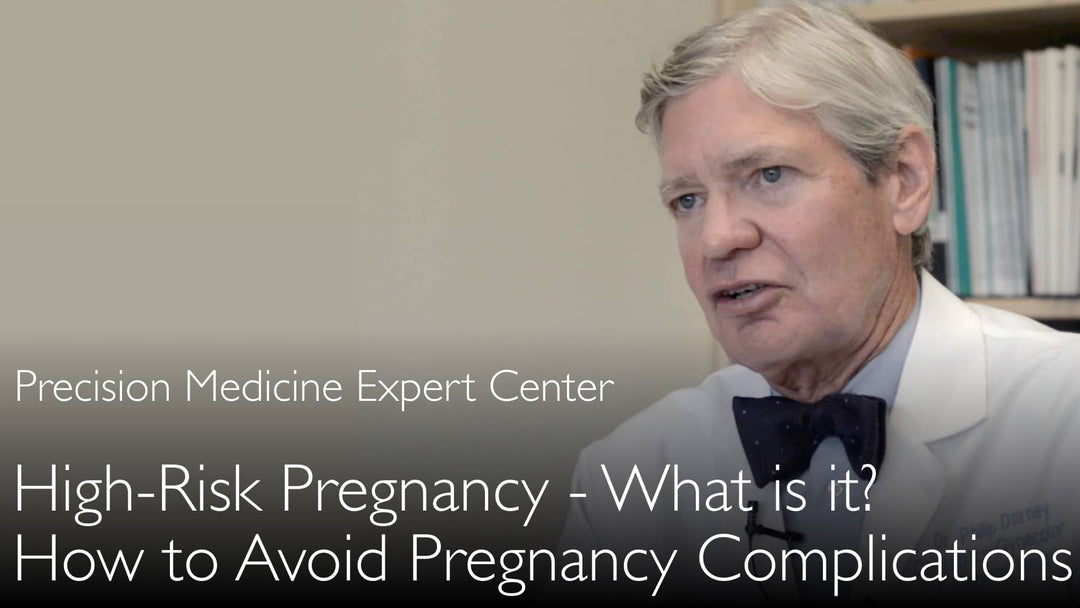Leading expert in obstetrics and gynecology, Dr. Philip Darney, MD, explains how to identify high-risk pregnancy factors like hypertension, diabetes, and genetic risks. He emphasizes early prenatal care for optimal monitoring and treatment of complications such as gestational diabetes or preeclampsia.
High-Risk Pregnancy: Key Warning Signs and Essential Prenatal Care
Jump To Section
- High-Risk Pregnancy Factors
- Pre-Existing Conditions That Increase Risk
- Lifestyle Risk Factors
- Genetic Anomalies and Pregnancy Risks
- Importance of Pregnancy Timing
- Prenatal Care Strategies for High-Risk Pregnancies
- Full Transcript
High-Risk Pregnancy Factors
Dr. Philip Darney, MD, identifies hypertension, diabetes, and obesity as primary indicators of high-risk pregnancy. These conditions require close monitoring from conception through delivery. Women with chronic illnesses should disclose their full medical history during the first prenatal visit to assess pregnancy risks accurately.
Pre-Existing Conditions That Increase Risk
Pre-pregnancy health significantly impacts pregnancy outcomes, according to Dr. Darney. Chronic conditions like type 2 diabetes or essential hypertension elevate risks for complications such as preeclampsia. Unlike gestational diabetes that develops during pregnancy, pre-existing diabetes carries higher risks for birth complications and requires specialized care protocols.
Lifestyle Risk Factors
Smoking and heavy alcohol consumption dramatically increase pregnancy risks, notes Dr. Philip Darney, MD. These behaviors can lead to fetal alcohol syndrome, low birth weight, and preterm labor. Obstetricians recommend complete cessation of these substances before conception to mitigate high-risk pregnancy complications.
Genetic Anomalies and Pregnancy Risks
Dr. Philip Darney, MD, emphasizes that family history of genetic disorders or advanced maternal age (over 35) warrants genetic counseling. Screening tests like amniocentesis or NIPT (non-invasive prenatal testing) become crucial for early detection of chromosomal abnormalities in high-risk pregnancies.
Importance of Pregnancy Timing
The UCSF specialist advises optimal pregnancy timing between ages 20-35 to reduce risks. Dr. Philip Darney, MD, explains that very young or advanced maternal age increases chances of complications like gestational diabetes or chromosomal disorders. Preconception planning helps address modifiable risk factors before pregnancy begins.
Prenatal Care Strategies for High-Risk Pregnancies
Frequent prenatal visits form the cornerstone of managing high-risk pregnancies, according to Dr. Darney. These allow early detection and intervention for complications like gestational hypertension. Specialized monitoring may include more frequent ultrasounds, glucose tolerance tests, and blood pressure tracking to ensure maternal and fetal wellbeing throughout pregnancy.
Full Transcript
What to expect in high risk pregnancy. How do you know if your pregnancy is high risk? Leading expert in obstetrics and gynecology explains key health implications of high-risk pregnancy.
High risk pregnancy - what to expect?
Dr. Anton Titov, MD: How do you know if you are a high risk pregnancy?
Dr. Philip Darney, MD: High blood pressure and diabetes are risk factors present before pregnancy. A woman with hypertension, diabetes, or obesity should ask "am I considered high risk pregnancy?" Her health should be monitored very closely.
How do you know if your pregnancy is high risk? Get a visit to doctor early in the pregnancy and share all your medical history. What are the factors that put a pregnancy at risk? They are high blood pressure, diabetes, clotting disorders or history of any significant chronic medical illness.
Dr. Anton Titov, MD: High-risk pregnancy - what to expect. What makes high-risk pregnancy? What are symptoms of high-risk pregnancy?
Dr. Anton Titov, MD: What signs should a pregnant woman pay attention to that can signal her pregnancy is "high risk"? What should a pregnant woman do if a doctor or nurse tells her she has reasons for high-risk pregnancy?
Dr. Philip Darney, MD: The most important factors in predicting a high risk pregnancy would be the health of the woman herself. Factors that predict high-risk pregnancy would be diabetes or high blood pressure before the pregnancy.
High-risk pregnancy risk factors do not include hypertension or gestational diabetes that develop during the pregnancy. Heavy drinking and smoking during pregnancy would predict high-risk pregnancy. Pregnant women should discuss these important issues with their obstetrician.
Dr. Philip Darney, MD: Genetic anomalies or factors that increase risk for genetic anomalies in the developing child are important predictors of pregnancy outcome. These risk factors can put a woman into high-risk pregnancy category.
Medical history during the first prenatal visit is important. It should reveal all these risk factors for high-risk pregnancy. A woman should be properly immunized prior to pregnancy.
I have already mentioned the importance of having the pregnancy come at the time when a woman is ready to be a mother. Woman should be not too young and not too old. This helps to avoid high-risk pregnancy problems.
For problems that develop during high-risk pregnancy, regular prenatal visits are the best method. They help to determine the severity of complications and initiate early treatment. Sometimes gestational diabetes is a complication of high-risk pregnancy.
Dr. Anton Titov, MD: High risk pregnancy - what to expect? Hypertension, diabetes, obesity, history of chronic disease before pregnancy are warning signs. Seek prenatal care early.




